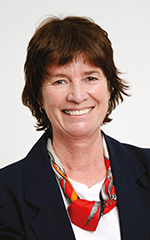
There are times when the news can get us down. Sadly the Bloodhound project aimed at breaking the world landspeed record at Hakskeen Pan in the Northern Cape has stalled, but there is other magic happening out there. I’m excited and fascinated by the story of the Square Kilometre Array (SKA), just one of South Africa’s many Centres of Excellence. Our radio astronomy has a rich history in this country, and the book Searching African Skies by award-winning science journalist and editor, Sarah Wild, tells the story from the first telescope built by NASA in the 1960s to South Africa challenging Australia to host the largest scientific instrument on earth. The new frontier is space, and as host to the largest radio telescope in the world, the SKA, we are well set up to explore the mysteries of the universe.

The SKA is an international science and engineering project aiming to build the world’s largest radio telescope. Modern radio telescopes are collections of antennae scattered over a large area. Using interferometry they work together as a single dish, with a total collecting area of all the antennae combined. The complexity of the radio images increases with the square of the number of radio telescopes. The SKA will have 2000 parabolic dish radio receivers and up to a million antennae sitting in South Africa and Australia. The array will have a receiving area of over a square kilometre, and will be able to detect faint radio signals from the early universe, giving an unprecedented view of the skies. Construction is due to start this year after an international treaty governing its membership and operations came into force in January. Completion could be as soon as 2027.
There is huge excitement in the science community. The SKA telescopes will allow scientists to look at the universe in detail previously only dreamed of, examining galaxies that were formed billions of years ago, and answering some of the fundamental questions about our universe − questions such as what happened immediately after the big bang, how galaxies form, the role of cosmic magnetism, the nature of gravity and dark matter, and whether humans are alone in the universe. We will be able to see galaxies up to 13 billion light years away, where the light that we see left them before earth had even formed.
The SKA is sited in a radio-quiet zone near Carnarvon in the Karoo, where atmospheric disruptions are minimal. Together with our world class scientific expertise, this was the deciding factor in South Africa winning the bid against Australia to host it.
Already up and running on the site is MeerKAT, now the world’s biggest and most sensitive radio telescope. It will eventually be part of the SKA’s mid-frequency array but it is a world class facility in its own right and is providing new insight into unexplained activity in the Milky Way. Since 2018, its 64 dishes have captured the most clear and detailed radio images yet of the region surrounding the supermassive black hole at the centre of the Milky Way, and revealed giant radiation bubbles. One outstanding image that was published shows a combination of cosmic features never before seen, revealing extraordinary details of the inner workings of enormous radio galaxies. Scientists have been stunned by the results. It was MeerKAT’s combination of sensitivity, angular resolution and dynamic range that made this possible.
The SKA is a wonderful model for global cooperation, and has pulled together more than 1500 of the world’s best scientists and engineers. It has given them unique opportunities to work at the highest level of design and innovation. There will also be technology spin-offs and commercial applications − for example, ways of processing massive amounts of data, new manufacturing and construction methods, and other innovations that will benefit society. There are many examples already − the Internet, Wi-Fi and GPS all came out of pioneering science projects.
The most important spin-off will be new knowledge, and the nurturing of young scientists and engineers with cutting-edge skills and expertise in scarce and innovative fields. The SKA has a special human capital development programme aimed at training young people. More than 1000 have benefited and they are already contributing to the knowledge economy by using their skills in many other areas; and SKA’s collaboration with industry partners across the board has helped the spread of scientific and operational expertise in other fields.
The SKA is about skills and capacity building, cooperation, technology, innovation, industrial return, knowledge transfer and spin-offs, but basically it’s about a wonderful scientific journey. How awesome is that?
| Tel: | +27 11 543 5800 |
| Email: | [email protected] |
| www: | www.technews.co.za |
| Articles: | More information and articles about Technews Publishing |

© Technews Publishing (Pty) Ltd | All Rights Reserved